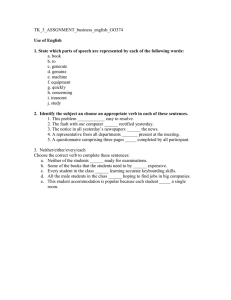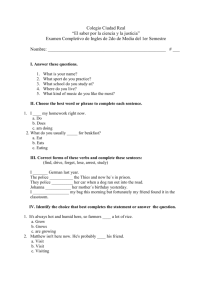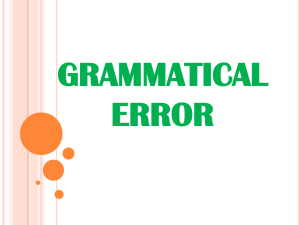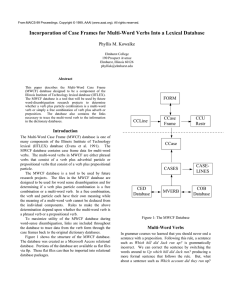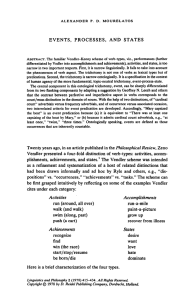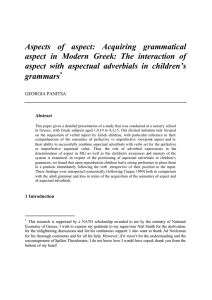大學-戲劇團 At university – the drama group
advertisement
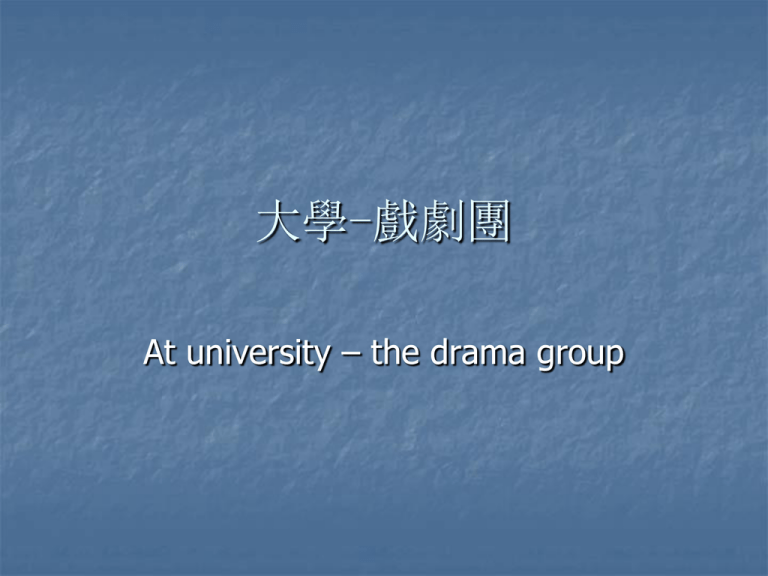
大學-戲劇團 At university – the drama group 大學-戲劇團 聽﹑說: 以上的短文﹐聽過兩次以後﹐再回答以下的問題。 1. 大偉在中學時是怎麼樣的學生﹖ 2. 大偉從什麼時候開始不再害羞了﹖他是怎麼做到的﹖ 3. 大偉如何讓自己改變的﹖ 4. 戲劇教師來了後﹐大偉的戲劇班有了那些活動﹖ 5. 大偉說加入戲劇班後發生了兩件他最喜愛的事。 他還提到另一件有意義的事。這三件事是什麼﹖ 6. 由第三件事﹐大偉談到了其他的活動﹐ a.是什麼﹖ b.對大偉有甚麼影響﹖ 大學-戲劇團 核對答案: 將你的答案或你同學的答案﹐與老師的答案一起核對。 1. 他很害羞。他從未參加過學校的任何社團、體育競賽或文 化活動。 2. 在他上中學的最後一年。他決定加入中學的戲劇班。 3. 他對自己說﹕‘我要改變﹐不要再害羞。要參加各種文化活 動。’ 4. 演出和旅遊。認識了一些人。 5. a. 參加了幾個國際性的戲劇節; b. 對他的幫助很大﹔他的人生改變了很多﹔更有自信了! 大學-戲劇團 寫: 可不停地重複聽短文﹐直到你聽到以下英文的中文說法﹐再寫出這些中文。 1. When I was at school, I was very shy 2. My life has changed quite a bit 3. In my last year at secondary school 4. Very positive experiences 5. I am much more confident 1.再中學的時候,我很害羞 。 2.我的人生改變了很多 。 3.就在我上中學的最後一年。 4.非常有用/幫助的經歷 5.我更有自信了﹗ 。 大學-戲劇團 學習要點(一): 1. 在中學的時候 ‘。。。的時候’ is a common construction denoting time, meaning ‘when’ or ‘at the time of’. It is usually preceded by a word, i.e. ‘休息的時候’。。。 (While resting…) 2. 從未參加過任何社團 ‘過’ placed after a verb indicates a past experience or action, i.e. 他看過這部電影。 (He has seen this film.) The negative is formed by adding ‘沒’ before the verb, i.e. 他沒看過這部電影。 (He has not seen this film.) 3. 就在我上中學的最後一年 One of the main uses of the adverb ‘就’ is to show the limit or scope, i.e. 就這些。 (Just this) 大學-戲劇團 學習要點(二): 4. 上了大學後 ‘了’ can serve as an aspect particle or as a modal particle. When functioned as an aspect particle, ‘了’ is placed after the verb to indicate the completion of an action, i.e. 昨天我們看了一個展覽。 (We saw an exhibition yesterday.) The negative is formed by adding ‘沒(有)’ before the verb and leaving out ‘了’, i.e. 昨天我們沒看展覽。 (We did not see an exhibition yesterday.) 5. 現在的我更有自信了 To state a degree of comparison, use ‘更’ for even more (or less), i.e. 這件襯衫更貴。( (This shirt is more expensive.)
